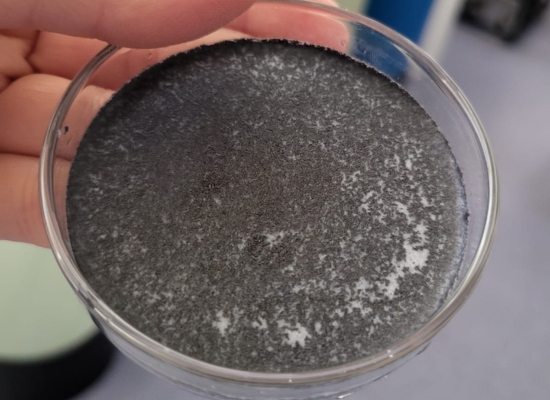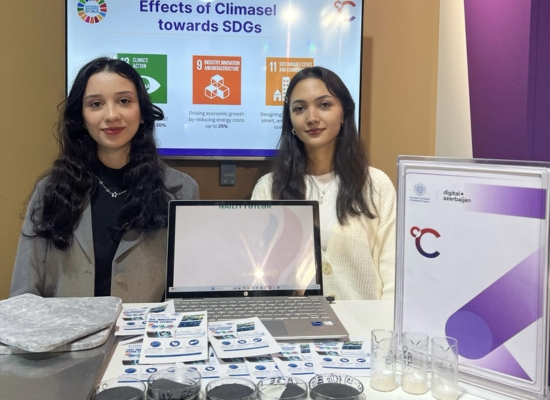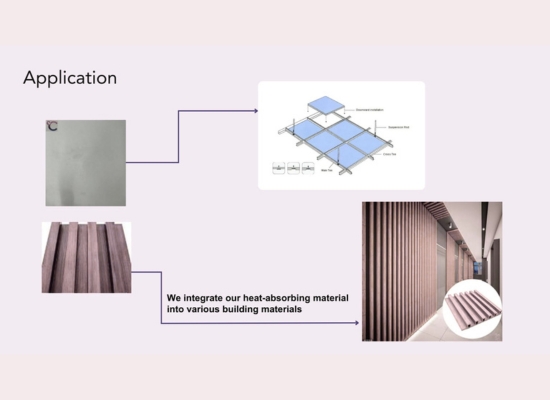A fresh breeze for an established product
Climasel began as a research project by a group of chemical engineering students of Baku Higher Oil School who chose Phase Change Materials (PCMs) as their focus. PCMs are substances that store and release thermal energy as they melt and solidify. They absorb heat when temperatures rise and release it as they cool, helping to regulate and stabilize surrounding environments. (Link) While exploring these materials, the team discovered that PCMs were already well-established in the construction industry—but also saw clear opportunities for improvement. Motivated by this potential, they set out to develop a new, more sustainable generation of PCM panels for indoor insulation, designed to save energy and cut carbon emissions.
“The main driver was the rising negative ecological impact, as well as the economic cost of energy and the challenges it creates for people in their daily lives”
, explains Khayala Miriyeva, CEO and co-founder of Climasel. The urgency is clear: buildings and construction are responsible for around 32% of global energy consumption and about 34% of CO₂ emissions. Cooling and heating alone make up roughly 15% of all energy-related CO₂ emissions. With cooling costs especially high in places like Azerbaijan—where summer temperatures can soar—the team set out to ease that burden with a smarter solution. At the same time, they were determined to ensure their innovation contributed to sustainability.Climasel’s small but dedicated team brings together four co-founders with complementary strengths: chemical engineering, materials science, commercialization strategy, and business development. Blending deep technical knowledge of sustainable materials and energy-efficient technologies with hands-on experience in R&D, product development, and market rollout, they share a common passion: turning scientific research into real-world impact.
Despite the team’s young age, Climasel has already earned recognition, winning multiple prizes in international competitions. But success didn’t come without challenges. As a research-driven startup, they faced the demanding task of extensive laboratory testing—work that required significant time and resources. Another hurdle was awareness: since their solution is relatively new, many people were unfamiliar with PCM technology. At first, this led to scepticism and a rather frosty reception.
“However, with successful trials and proven results, we managed to break the ice and overcome these doubts”
, says Khayala.The name Climasel itself reflects their vision, blending “climate” and “solution” to highlight their mission: developing innovations for a more sustainable and energy-efficient future.
Too hot to handle
Climasel has developed innovative heat-absorbing panels made with a bioengineered phase change material (PCM), combined with cellulose and graphite. This simple yet powerful design allows the panels to act like “heat batteries”: storing excess heat during the day and releasing it at night, reducing the need for conventional air conditioning. Unlike energy-hungry AC systems or existing PCM solutions that rely on heavy plastics and complex encapsulation, Climasel’s panels are thin, lightweight, leak-proof, and highly efficient—boasting an absorption rate of up to 240 joules per gram. The impact is twofold: up to 30% lower CO₂ emissions from cooling and cost savings of as much as 25%, with a payback period of just 2.5 years.
“This scalable solution provides sustainable cooling for corporate offices and construction companies worldwide”
, says Fatima Nasirova, CMO & Co-founder of Climasel.The panels not only cut energy use but also minimize environmental impact. They are manufactured using bio-based materials and are designed to deliver reliable thermal performance for up to 10,000 cycles, which corresponds to approximately 10 to 15 years of use in typical building applications. Throughout manufacturing, use, and disposal, the product maintains a low environmental footprint. At the end of its lifecycle, the panels naturally biodegrade under appropriate conditions, eliminating the need for special disposal processes.
The first PCM is optimized for an activation point of 24°C to suit Azerbaijan’s climate—but can easily be tailored for different regions around the world.
Air conditioning currently accounts for about 10% of global electricity use . If demand keeps growing at today’s pace, it could triple by 2050—straining energy grids and driving emissions even higher. Climasel tackles this challenge head-on. Their bio-based Phase Change Materials (PCMs) not only minimise energy consumption but also deliver a net-negative carbon footprint per square meter compared to conventional air conditioners.
Next up at Climasel
The startup is currently focused on piloting and validating Climasel panels in real building environments to demonstrate their effectiveness and gather precise performance data. Panels are being tested at different sites and compared with conventional cooling systems to highlight both energy cost savings and CO₂ reductions. At the same time, the company is preparing for market entry—refining production, strengthening partnerships with construction firms, and engaging early adopters in corporate offices. The team states that, this stage is crucial for them to prove impact, build trust, and scale sustainably.
Looking ahead, Climasel’s next step—once scalability is validated—is to expand into European markets, starting with corporate offices. In the long run, their vision is to bring natural cooling to cities worldwide, making it both accessible and affordable, while continuing to improve their technology to maximize energy efficiency and positive environmental impact.
With their innovative approach, Climasel, who joined the ISC3 Global Start-up Service as one of the Innovation Challenge finalists in Sustainable Chemistry and Climate Change in June 2025, actively contributes to SDG7 (Affordable and Clean Energy), SDG9 (Industry, Innovation, and Infrastructure), SDG11 (Sustainable Cities and Communities) and SDG13 (Climate Action).




